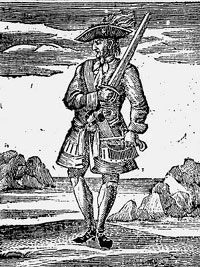《加勒比海盗》1(精讲之六)
[ 2007-04-13 18:23 ]

影片对白
Commodore, I beg you, please do this for me. As a wedding gift.
考考你 现学现卖
4. Shiver my timbers
Shiver my timbers (often misquoted as Shiver me timbers) is an exclamation in
the form of a mock oath usually attributed to the speech of pirates in works of
fiction. 文学家们常用这一词语来表示"震惊,惊讶或是恼怒"。当船在海上航行遇到风浪的时候,海浪使得船上下摇晃,船员感到很恐惧,由此引出了这个shiver
my timbers。
5. Sit well with
"Please, fit or suit, be acceptable to 合适,接受"的意思,例如:I don't think that
explanation sits well with the headmaster.
文化面面观
历史上著名的海盗
Edmund Cook (Cooke)
1679-81? English. Ship: Trinity. Cook was among the few buccaneers with a
semi-legitimate excuse for his piracies. In December 1673, as he headed toward
England with valuable goods (possibly smuggled out of Cuba), a Spanish vessel
captured his ship near Havana and turned her crew adrift. Claiming that Madrid
refused to reimburse his losses, Cook acquired a letter of reprisal. Early in
1679, he landed in Cuba, ambushed a Spanish ship, and sold her cargo in Jamaica.
William Dampier was hired as a surgeon by Cook and a Captain Lynch, who
planned to sail together. However, Cook's small ship was alone when he reached
the Panamanian coast in February 1680. There he ran into Bartholomew Sharp's
company, which had just sacked Portobelo. Excited by their success, Cook and his
men enlisted in a new adventure. Under John Coxon's command, the pirates marched
across the Isthmus and won a fierce battle near Panama City on May 3.
Soon after the battle, Cook received command of the 100-ton Mayflower,
captured at Pueblo Nuevo. But her crew refused to accept Cook as captain and he
moved to Sharp's flagship, the Trinity. Cook joined in raids along the Peruvian
coast and was still on board when they reached the Juan Fernandez Islands in
January 1681.
After another mutiny, John Watling took Sharp's place as captain and
immediately imprisoned Cook in irons for homosexual acts. Since homosexuality
was commonplace among the buccaneers, Watling's act is difficult to understand.
Cook is not mentioned again, and he probably died soon after.
John Rackham ('Calico Jack')
 |
|
Contemporay picture of John
Rackham | July 1718 to November 1720. English. Ships: William. Nicknamed 'Calico Jack'
because he wore clothing made of calico (a white cloth imported from Calcutta,
India), John Rackham was typical of many pirates whose sloops preyed on coastal
shipping. Little is known of his origins, but by 1718 he had somehow made his
way to New Providence Island. He served with Charles Vane, fleeing the Island
when Vane escaped from Governor Rogers. By the spring of 1719 he was elected as
quartermaster, and became Vane's deputy. Soon after a quarrel broke out among
the crew, and Rackham replaced Vane as the Captain. Vane was put ashore and
Rackham continued Vane's cruise in two sloops.
According to some accounts the vessels were both lost when a Jamaican based
patrol sloop captured them while most of the crew were ashore. Rackham returned
to New Providence, and in May 1719 he was granted a pardon by Governor Rogers as
a part of Rogers' general pirate amnesty. It was there he met Anne Bonney, wife
of James Bonney, and they became lovers. Law-abiding life ashore proved
unpalatable, and in August 1719, with other former pirates, Rackham and Bonney
stole a sloop named William, and returned to piracy. His crew included the
female pirates Anne Bonney and Mary Reade. Based in Bahamian waters, he cruised
between Bermuda and Hispaniola, capturing several ships and a number of
profitable cargoes. He then sailed around Cuba attacking local craft before
reaching the north coast of Jamaica. There his luck ran out. While at anchor off
the western tip of the island, he was surprised by a sloop belonging to the
Governor. Most of Rackham's nine male crew were drunk, but according to
testimonies the women roused the men into action. The William cut her anchor
cable and fled, but was overhauled by the Jamaican sloop during the night. The
ships exchanged fire, and then Captain Barnet led a boarding party onto the deck
of the pirate vessel. Bonney and Reade were the only members of the crew who
offered any kind of resistance. Rackham himself was apparently too drunk to
defend himself. The women were overcome, and the pirates were taken to Port
Royal to stand trial. He was tried on November 27th and hanged the next day.
|